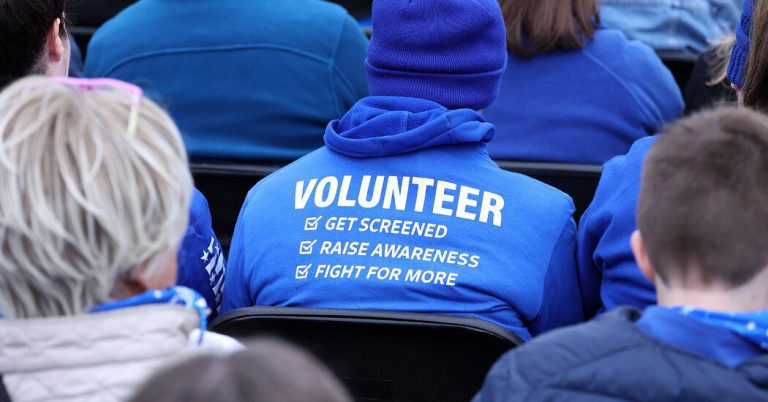Early detection of colon cancer can prevent the majority of deaths from this disease, possibly up to 73 percent of them. But only 50 to 75 percent of middle-aged and older adults who should be screened regularly are being screened.
One reason, doctors say, is that screening methods put many people off.
There are two options for people at average risk: a colonoscopy every 10 years or a stool test every one to three years, depending on the type of test.
Or, as Dr. Folasade P. May, a gastroenterologist at UCLA Health, “either you take this horrible laxative and then a doctor puts an instrument behind you, or you have to handle your own poop.”
But something much simpler is on the horizon: a blood test. Gastroenterologists say such tests could become part of the daily blood drive that doctors order when, for example, a person comes in for an annual physical.
“I think this is going to start to take off,” said Dr. John M. Carethers, a gastroenterologist and vice chancellor for health sciences at the University of California, San Diego.
About 53,000 Americans are expected to die from colon cancer this year. It is the second most common cause of cancer-related death in the United States, and while the death rate in older adults has decreased, it has increased in those under 55.
Current guidelines recommend screening starting at age 45. The problem is getting more people to get screened.
Enter the blood test. It takes advantage of the discovery that colon cancers and large polyps — clumps of cells in the lining of the colon that occasionally turn into cancers — shed DNA fragments into the blood.
A study published Wednesday in The New England Journal of Medicine found that a blood test looking for such DNA called Shield by the company Guardant Health detected 87 percent of cancers that were at an early and curable stage. The false positive rate was 10 percent.
“This is going to be big news,” said Dr. May, who consults with Exact Sciences, the maker of the Cologuard stool test.
But there’s a caveat to the blood test: Although it detects cancers, it misses most large polyps, finding only 13 percent of them. By contrast, the stool test detects 43 percent and the colonoscopy finds 94 percent, Dr. Carethers said.
While polyps are usually harmless, a few can turn into cancer, so doctors want to find all of them and remove them to prevent cancer from forming.
Dr. Barbara Jung, chair of the department of medicine at the University of Washington and president of the American Gastroenterological Association, said patients should be fully informed before choosing a blood test. In particular, they need to understand that while this test helps detect cancer early, it does not prevent it because it is not good at finding precancerous polyps.
“We need to have that conversation” with patients, he said. But, he added, “much of this will fall on primary care physicians who are already hard-pressed to go through a litany of screens and consults.”
Doctors should also explain to patients that if the blood test result is abnormal, they should schedule a colonoscopy to look for polyps or early-stage cancers and remove them if they are present.
It’s also not clear how often people should have the blood test. Guardant recommended every three years, but that recommendation is not well-documented, Dr. Jung said.
Dr. Jung added that she would like to know whether the blood test performs well in people too young to qualify for existing screening tests. But this will require additional studies. He is concerned about rising rates of colon cancer in younger people. It would be “very appealing,” he said, if people could get a blood test for colon cancer in their 30s.
“That would be my greatest excitement,” Dr. Jung said.
The big unknown, however, is the cost. Guardant has applied to the Food and Drug Administration for approval to market the test. The company now sells it as a “lab test,” which doesn’t require FDA approval, but is also not covered by health insurance. For those willing to pay out of pocket, the price is $895. But the company will work with Medicare and Medicaid and with private insurers to “finalize pricing” if approved, said Matt Burns, a Guardant spokesman.
Dr. William Grady, the medical director of the gastrointestinal cancer prevention program at Fred Hutchinson Cancer Center, who is a corresponding author on the Guardant-sponsored trial, said the company could come up with a price that would make it comparable to value of other screening methods. The Cologuard stool test costs $581 to $681. Colonoscopies, which usually take half as often, typically cost $1,250 to $4,800, although some hospitals charge more. The average cost of a colonoscopy in the United States is $2,750. Tests are usually covered by insurance.
Dr. May cautioned that patients should be aware that these three screening tests are not equivalent. With the blood test, he said, “we move from prevention to early diagnosis.”
But, he said, the blood test is easy enough. When a doctor orders the usual blood test, all that needs to be done is to add a test for colon cancer.
“This is incredibly exciting,” he said.
And its ease of use could offset the test’s limitations, said Dr. Carethers, who wrote a journal article accompanying the study. After all, he said, the goal of screening is to reduce deaths from colon cancer for the entire population.
If a blood test means that many more people will be screened, the result – fewer deaths from colon cancer – will be beneficial.
“The best screening test is one that is completed by the patient,” he wrote.




